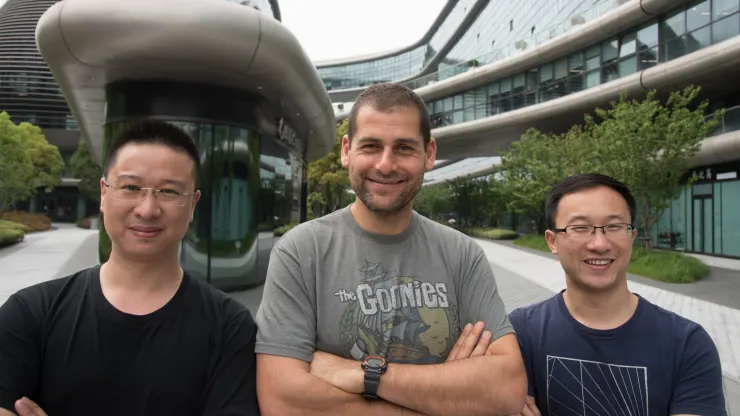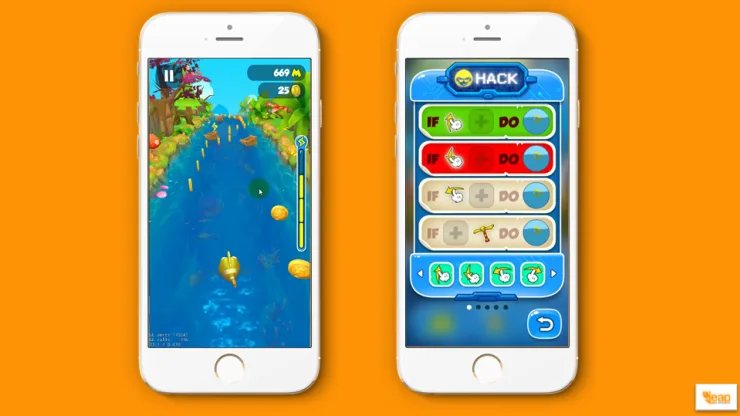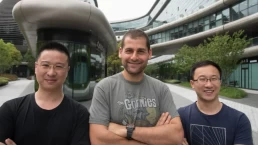Why Israeli entrepreneur Ami Dror believes that every child must learn coding
In 2017, Israeli entrepreneur Ami Dror launched LeapLearner, an edtech company that teaches coding to one million students in 20 countries. As the startup enters India, the founder reveals why every child must learn this ‘language of the future’.
Ami Dror, Co-Founder and CEO of LeapLearner, a Cayman Island-based edtech company that teaches children to code and has recently forayed into India, has seen many seasons as an entrepreneur.
Father to three children, Ami is passionate about cultivating children's ability to be innovative. He has authored, Raising Future Innovators, a book that aims to give parents and educators the tools to raise the next generation of global leaders.

Ami’s first startup venture was the 3D Cinema industry front-runner, XPAND 3D. He initiated work on the first 3D TV technology and led the formation of a 3D TV licensing company, jointly owned by Sony, Samsung, XPAND and Panasonic. He is also the Co-founder of Zaitoun Ventures, a startup accelerator that helps startups across multiple sectors.
Earlier in his life, Ami served as a Captain in the Israeli Secret Service (Head of Security for Prime Minister Benjamin Netanyahu and President Shimon Peres) and a diplomat in Israel’s Ministry of Foreign Affairs. He is a Henry Crown Fellow at the Aspen Institute, a member of the Aspen Global Leadership Network, and a member of the Aspen Institute Moderator Corps.
Ami works closely with international non-profit organisations and is passionate about leveraging technology education to empower underprivileged populations across the globe.
With LeapLearner, he aims to empower children by teaching them how to code. With a presence in more than 20 countries, the startup offers courses like Block Coding, App Development, Advanced Python, Robotics, and AI for children between the age of five and 14 years.
The edtech startup kicked off its India journey in February this year with an office in Gurugram and appointed edtech entrepreneur Rahul Ranjan to head its India division. The company has committed an investment of $10 million in India and is now changing the way coding is taught to kids.
In a freewheeling conversation with YourStory, Ami talks about how LeapLearner came into being, why coding is important for kids, why LeapLearner is different, how he is driving LeapLearner in a time of crisis, and how education looks like in a post-COVID-19 world.
Edited excerpts of the interview:
YourStory (YS): Tell us about the genesis of LeapLearner. What was your eureka moment?
Ami Dror (AD): I learnt coding when I was about 10 years old. It was a very early version and was the foundation that shaped things later in my life. My daughters were introduced to coding in school at the age of eight and nine as coding is mandatory in Israel’s primary school system. Soon they developed an interest and wanted to learn more. I decided to teach them and started checking online sites, but the information was scattered and not suitable for children.
That is when I decided to start a LeapLearner in 2017, a company that would teach kids around the world how to code. It initially started in Israel and later moved to China, where we grew in an amazingly exceptional way.
In less than four years, the idea saw astounding growth: from teaching my kids to a million kids around the world. That's kind of amazing.
YS: Tell us about your offering before coronavirus hit us all.
AD: The platform had a bunch of offerings. We provided 1:1 tutoring online, prepared kids for the Olympics (in programming), and even worked with the governments of Israel, Nigeria, and Bhutan.
We also work with a lot of private and international schools, and offer them the LeapLearner platform, teaching tools, curriculum, and teacher training. This needs a teacher who knows how to teach and how to make coding fun and engaging. We are focused on project-based learning.
YS: How has LeapLearner grown since inception?
AD: LeapLearner was launched in 2017. In the first year, we were 100 percent devoted to R&D, with about 70 engineers working on the platform. During the first year, the company started with a few thousand kids; we moved on to tens of thousands and now teach one million kids. We started from Israel, went to China, and now we are present in over 20 countries and still growing.
YS: What are the age groups on LeapLearner, and how do your users learn coding?
AD: The students’ age ranges from five years to young adults. But, the majority are between five and 12 years.
The LeapLearner platform makes it extremely easy to code and see what you are doing. It is a big and complex learning system, and we keep improving it all the time. The curriculum was developed with teachers, based on inputs/feedback during training sessions.
We always have a teacher available because the problem with coding is that it is very easy to learn the initial levels with games etc, but you need someone to help with advanced coding. Just like math. The teacher sometimes teaches 1:1, in a group, or online, and then they take tests.
YS: There are various edtech companies offering coding courses? How are you doing it differently?
AD: LeapLearner is definitely the biggest company in the world in coding, innovation, and teaching how to code. There is no other company with global scale like ours.
We have a team of experts from universities around the world. There is a very standard way of how to teach coding, which was built for university students. We took that syllabus and converted it into project-based learning so that kids can develop their own projects versus we tell them what to do.
At present, we have a team of 30 people who create and keep improving the syllabus real time. We improve and change our syllabus with every piece of code, every scale, and with real-time feedback.
YS: Can you share a few examples of what you mean by project-based learning?
AD: A group of kids from China all got through Yale - they had developed a management system using coding for their school and this project was one of the reasons they qualified for Yale. We have another group that went through Stanford with a similar story.
There are kids who developed small software for their family business and little shops. We have kids who did their science research with the help of coding. A girl developed painting software because she is an artist. In China, more than 1,000 children developed a game together, a running game.
YS: Tell us about your India plans.
AD: India is our most recent global expansion. Since we launched LeapLearner, it was very clear to us that the most important markets for the company would be India and China. We got to China early and now India.
India is growing as fast as China. We launched a few months ago and already have more than 10,000 students. Why India? It is very obvious: education is taken very seriously in India. The families here are very similar to those in Israel and China.
There is a very strong need for digital education and people understand that coding is the language of the future.We have so far invested $ 10 million in India and will keep investing as it is a very important market.
YS: Why do you think kids should learn to code?
AD: Coding is a language, and is as important as math, English, or any other subject. It is the only way to communicate with technology. It is essential for every child to know coding because it is the language of the future.
Everybody knows this language, but we do not know how to read and write in it. While using technological machines and devices, you are speaking “robotics”, you are interacting with the technology. So, the people who can read and write the technology are actually designing the technology of the future.
There will be a great barrier between the people who will actually design the future and those who will just use technology created by others.
YS: What is the potential of learning to code in a country like India?
AD: It’s not only about India. Every child in the world, no matter what s/he wants to do or be - a basketball player, chef, lawyer, or author – needs to know how to code.
The goal is not to become a genius, but to know because this is the only way in which you can interact with and create technology.
YS: How has COVID-19 impacted LeapLearner’s journey?
AD: LeapLearner has a very strong online offering globally, but we had planned to rollout the online business from summer. The team was running pilots already and we were able to shift most of our existing students online when the lockdown started. We have also been growing our customer base by about 30 percent week on week.
Our online offering was always live 1:1 classes. Realising that a large number of students might not be able to afford the same due to high unit costs, we have introduced live online group classes while maintaining a high degree of student engagement and teaching-learning effectiveness. This has allowed us to broaden our reach from a target group perspective.
Apart from our core offering, we have also helped many schools set up online classes free of cost. We were able to create quick and simple solutions for schools to take teaching-learning online, thanks to a strong global tech team. We are currently doing about 150-200 demo classes a week.
YS: Given that coronavirus isn’t going away soon, what future do you see for LeapLearner?
AD: One of our biggest business drivers was B2B2C partnerships with K-12 schools and after-school centres. Before COVID-19, we would generally have trainers being physically present inside the classroom with children in groups of 20-25.
After the scheduled summer break, we will need to look into alternative methods of offering our computational thinking courses in coding and robotics for group classes.
A live online class framework, clubbed with innovative pedagogy of student engagement and measuring of learning outcome, is being developed for school-based classrooms.
This Chinese-Israeli start-up wants to change the way kids learn to code
LeapLearner, a Shanghai-based education start-up, aims to teach children as young as five years old how to code and then some.
The start-up’s main service might be a platform that educates children on programming, but its ultimate goal is to impart skills needed in the future to children, LeapLearner’s co-founder and CEO Ami Dror told CNBC in an exclusive interview.

“Coding is just a tool,” Dror said, adding that he sees the learning process of coding as instrumental to teaching children how to innovate and problem-solve.
Dror, a fellow at the Aspen Institute-linked Aspen Global Leadership Network, taught himself to code as a child. The entrepreneur was head of security for an Israeli prime minister and dabbled in the consumer 3D space in the past. Also part of LeapLeaner’s founding team are Aaron Tian, a popular mathematics tutor in China, and Leo Zhao.
There are around fifty people working at LeapLearner, Dror told CNBC. Half of that team have backgrounds in gaming and focus on the technological aspects of the start-up, while another team focuses on the educational side of the business.
The edutainment start-up also counts several illustrious names among its backers. Dror said that Honeywell President for Global High Growth Regions Shane Tedjarati and former Alibaba CTO John Wu are among early stage investors in the company.
It was Wu, who acts in the capacity of an adviser, that convinced him to launch LeapLearner in China, Dror said. Wu also ensures that what the start-up does is scalable in changing the way people learn, Dror added.
Combining a series of online and offline platforms, LeapLearner works on a cycle that involves three weeks of self-learning followed by a hackathon.
During the first three weeks, children learn aspects of coding on their own at home. First, children are exposed to code used in games they play by being allowed to change variables in the code of those games. For example, in a game like Pac-Man, children can “hack” the game by switching up the ways characters appear on the screen: pac-dots could be changed into bananas and Pac-Man could turned into a pet dog.

Once they understand variables, the children move on to practicing through natural language programming 一 a way of programming in the style of human language. When the child has mastered that, they move on to the coding platform itself, where they get to code with Java Script.
After the self-learning process is complete, the children gather in the fourth week for a hackathon where they meet other LeapLearner users in person and compete in teams to create games of their own.
In Dror’s words: “It’s not a game 一 it’s an educational platform.”
Besides the offline aspect of learning, LeapLearner differs from existing players in the coding education space because of how it is tailor-made to sustain engagement among children.
Some platforms, such as the Massachusetts Institute of Technology-developed Scratch — which uses blocks instead of words to allow users to program — make it easy to get kids involved in basic coding, but children stop using it when coding becomes more advanced, Dror said.
“It’s like learning engineering with Lego,” he added.
On the other hand, offerings from institutions like the Khan Academy can be too dull for younger users.
“The problem with Khan and Codeacademy is that the kids’ engagement is very low as both companies teach how to code with classroom-like tasks,” Dror said, adding that LeapLearner circumvents this by by teaching children through the process of developing video games.
For now, LeapLearner will only be launching in Shanghai, before being rolled out across greater China and Asia Pacific. Dror said the start-up will subsequently expand to the Middle East and South American markets as investments in education in those regions are high and demand for innovative, high quality educational products is strong.
The Beta version of LeapLearner will be available on April 25, while the platform opens to the public in Shanghai on June 1. Dror said that he is targeting 5,000 users in Shanghai before rolling LeapLearner out to the rest of China.
As for its pricing model, Dror said users would pay an annual “tuition” fee, of which there are several price levels to choose from. Pricing would be “more like school tuition … and less like buying an online service,” he added.
LeapLearner has currently secured $5 million in seed funding, of which 10 percent comes from Zaitoun Ventures, an Israeli-Palestinian investment firm that Dror co-founded.
While he preferred not to disclose LeapLearner’s target for its next round of funding, Dror noted that the start-up was looking at a “big round” for the end of the year.
LeapLearner, the World's Largest Coding Education Company, Launches in India
LeapLearner India joins the company's global network of over 1,000,000 students located across 20 countries, including China, Israel, and the US.
2020 kicked off with the launch of LeapLearner India, the EdTech giant's most recent global expansion into a new and promising market. The company will be based out of Gurugram and managed by Indian EdTech entrepreneur, Rahul Ranjan. LeapLearner International's Co-Founder and CEO, Ami Dror, will also serve as Chair of the global corporation's Indian enterprise. Dror, an Israeli serial entrepreneur, moved to Shanghai in 2016 to launch LeapLearner in China together with renowned mathematics education expert, Aaron Tian. The company has since reached over a million students through their online and offline offerings for the acquisition of 21st century skills.
Following the extreme popularity of their cutting-edge computational thinking courses in China, LeapLearner India will now offer this curriculum for students ages 5-14 across India. Through LeapLearner's uniquely designed platform and learning tools, children will learn coding languages such as Scratch and Python, as well as App Development, AI, Robotics & Machine-Learning. The company's pedagogical approach and intuitive learning platform have been customized for Indian teaching-learning methods.
In less than two months prior to the company's launch, LeapLearner India already registered over 1,500 students. The company plans to onboard over 10,000 students in its first year of operations. In addition to one-on-one online lessons, courses will be available at over 40 learning centers and ten K-12 Schools. As LeapLearner India grows and expands its activities, the company will enable top-rated teachers to offer home tutoring and small-group offline classes as well.
As an impact-focused company, LeapLearner has joined forces with ICode, a US-based non-profit focused on expanding opportunities for computational thinking education through local, national and international junior coding competitions. LeapLearner students will be certified by ICode and will also be invited to participate in ICode's upcoming India Junior Coding Competition in October 2020. Through this competition, LeapLearner students in India will join the more than 80,000 students that have participated in ICode competitions around the world. Top achievers may even find themselves invited to attend ICode's Global Coding Olympiad in Shanghai in the Summer of 2021.
About LeapLearner
LeapLearner is World's Largest Coding Education Company with over 5,00,000 Students across 20 Countries. In India we offer Computational Thinking Program through Courses in Coding, Robotics, App Development, IoT & Logic for aged 5-14 years.
Photo- https://mma.prnewswire.com/media/1086497/Rahul_Ranjan_and_Ami_Dror.
(This story has not been edited by Business Standard staff and is auto-generated from a syndicated feed.)



